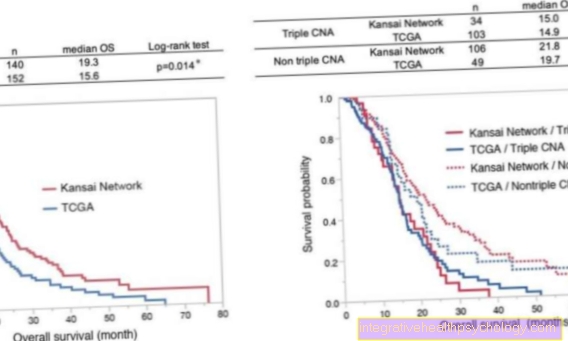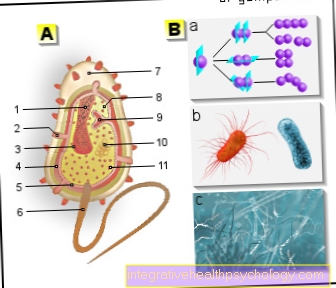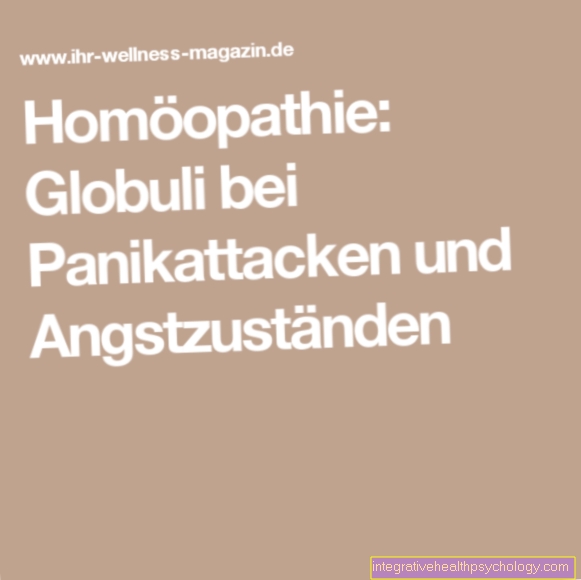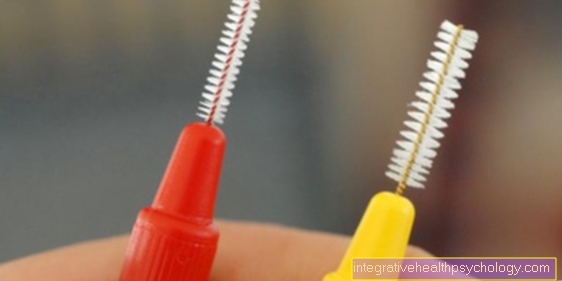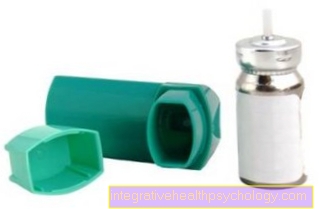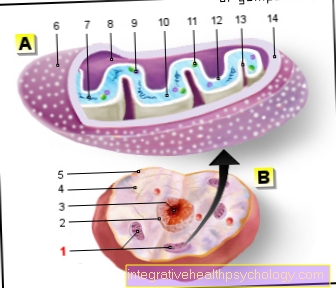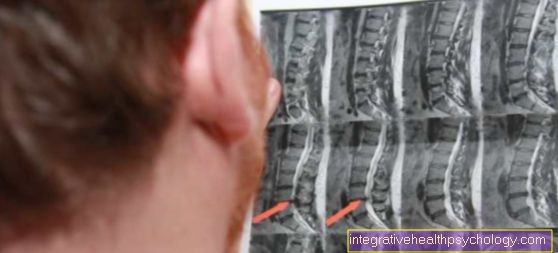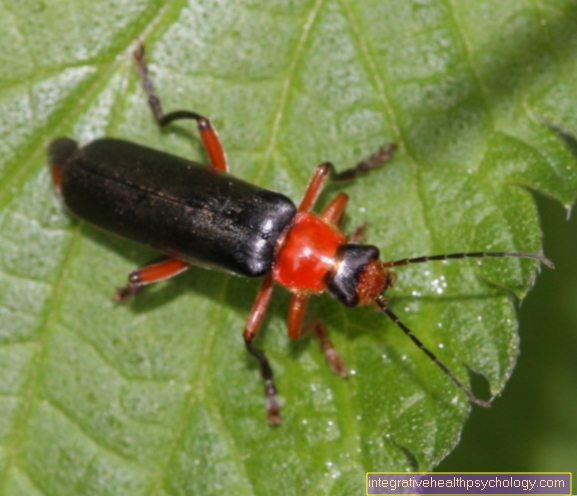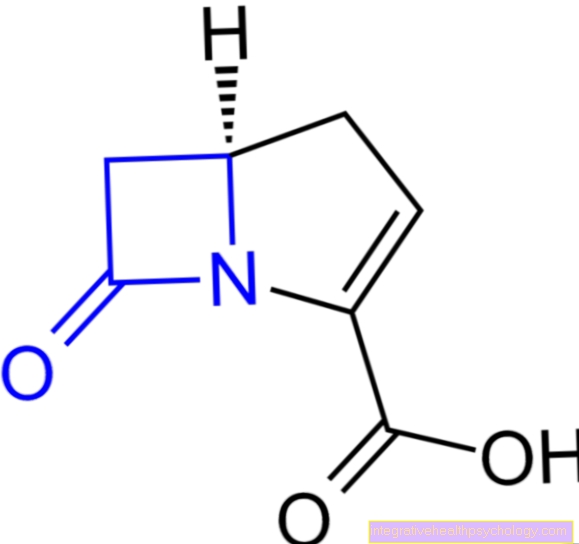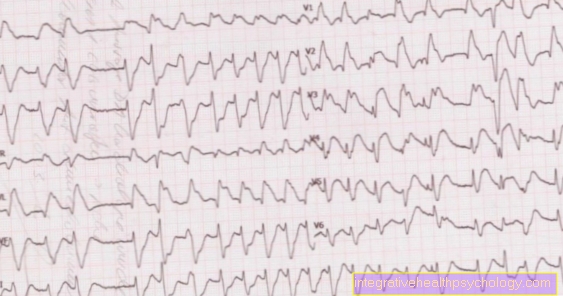Sinupret Extract
introduction
Sinupret extract is a herbal medicine. The ingredients gentian root, primrose blossoms, dock wort, elderflower and verbena are combined in a prescribed dose and offered as a dry extract.
Compared to Sinupret forte the individual ingredients in Sinupret extract are contained in a four times higher dosage. Sinupret extract is used for acute and uncomplicated inflammation of the paranasal sinuses (sinusitis). These often occur as part of a classic cold and are accompanied by runny nose, a stuffy nose and headaches.
Also read: Sinupret forte

Indications for Sinupret Extract
Sinupret Extract is used for acute and uncomplicated inflammation of the paranasal sinuses (sinusitis). In the case of chronic sinus inflammation (longer than 3 months) Sinupret extract can also be used - in most cases, however, further drug treatment and, if necessary, surgical procedures are required. Sinus inflammation often occurs as part of a cold.
It is usually triggered by a virus infection, but in rare cases it can also be caused by bacteria. The pathogens penetrate through the nasal mucous membrane into the individual paranasal sinuses. Classic symptoms are: runny nose (rhinosinusitis), nasal congestion, headache, pressure pain in the upper jaw and forehead area. All paranasal sinuses (frontal, maxillary, sphenoid, ethmoid sinus) can be affected - most often inflammation is found in the area of the maxillary and ethmoid sinuses.
Please also read our topic: Treating a cold
From what age can Sinupret Extract be given?
Sinupret Extract is only approved for adults and adolescents aged 12 and over. Insufficient data are available for use in children.
Sinupret Extract 20
Sinupret Extract 20 is a delivery form of the drug Sinupret Extract. It is a pack size of 20 tablets, with which those affected can get by for about a week.
Sinupret Extract 40
Sinupret Extract 40 is also a pack size of 40 tablets, so that those affected can get by with it for around two weeks. Longer use is not recommended, as it is then no longer an uncomplicated sinus infection and other medications are necessary.
Active ingredient and effect
The herbal medicinal product Sinupret extract consists of a combination of five ingredients (gentian root, primrose flowers, dock wort, elderflower and verbena). These are each dry extracts - the ingredients are extracted from the plant with a solvent (ethanol).
By combining the individual substances, Sinupret extract has a strong expectorant and anti-inflammatory effect. Antiviral effects could also be demonstrated. The expectorant effect is due to an increase in the secretion of chloride ions in the upper respiratory tract.
Higher chloride concentrations cause water to flow in, which liquefies the mucus. The mucus that occurs as part of a sinus infection is loosened and can be coughed up or removed by brushing your nose. At the same time, the anti-inflammatory and antiviral effects fight the cause of the disease.
The individual ingredients of Sinupret extract have different effects and, thanks to their combination, are so effective against inflammation of the sinuses.
Gentian roots lead to increased salivary and gastric acid production via bitter substances.
Primrose blossoms and dock herb have an expectorant, anti-inflammatory and slightly antibacterial effect.
Elder flowers make it easier to cough up by increasing the bronchial mucus and at the same time have a slightly fever-lowering effect.
Verbena has anti-inflammatory effects in the upper respiratory tract.
side effect
Side effects after taking Sinupret extract are rare. Gastrointestinal complaints are most common (1-10 out of 100 patients). Nausea, gas, diarrhea, dry mouth and stomach pain are possible. In addition, hypersensitivity reactions in the skin area (rash, reddening) and dizziness are occasionally (1-10 out of 1000 patients). The hypersensitivity reactions are intolerance to individual ingredients of Sinupret extract. No other side effects have yet been reported.
It should be noted that the tablets also contain other ingredients that can be found on the package insert. These include glucose and sucrose, which you should watch out for in the case of known intolerance to sugar.
If side effects occur, a doctor should be consulted immediately and further use of the drug should be discussed.
interaction
So far, no studies on the systematic interactions of Sinupret extract with other drugs have been performed. Possible interactions have not yet been reported. However, due to absorption in the intestine, metabolism in the body and transport in the blood, interactions cannot be ruled out.
If you experience any symptoms associated with the use of Sinupret extract, you should consult a doctor immediately. The patient should inform the doctor about taking any other medication.
Contraindications
An absolute reason for exclusion from using Sinupret Extract is hypersensitivity to one of the components. Sinupret Extract must also not be used in the case of known stomach or duodenal ulcers.
Inflammation of the stomach is not an absolute contraindication, but should be carefully monitored if Sinupret Extract is to be taken. In the case of a very rare inherited fructose intolerance or a glucose-galactose uptake disorder, Sinupret Extract should be avoided because it contains various sugars in addition to the active ingredients.
dosage
Sinupret extract is taken in the form of tablets. In doing so, the intake described in the package insert should be followed in order to ensure effectiveness.
One Sinupret extract tablet should be swallowed whole three times a day (morning, noon, evening) and with a sip of water. It can be taken independently of meals, but it is recommended to take it after meals if the stomach has a sensitive stomach.
No data are available on a dose adjustment for renal or hepatic impairment.
Sinupret extract should be used for a maximum of 7 to 14 days. If after this time the existing symptoms have not improved or worsened, a doctor should be consulted in order to examine other possible causes of sinus inflammation.
How should Sinupret Extract be taken?
Sinupret are coated, green tablets. This should not be chewed or crushed. The tablets can be taken with meals and should be swallowed with sufficient water. Hot drinks should not be used for swallowing, as these can directly dissolve the coating on the tablets. If symptoms fail to improve, those affected should consult a doctor and discuss other treatment options with him.
How long should I take Sinupret Extract?
Sinupret Extract can be stopped as soon as the symptoms have subsided. This is often the case after just seven days. If the symptoms have not gotten better after 14 days or even get worse, a doctor should be consulted to discuss other possible therapies.
In the case of chronic sinus infections, Sinupret Extract should not be taken permanently.
Can you overdose on Sinupret Extract?
Like every drug and all other substances, Sinupret Extract can also be overdosed. Acute poisoning with Sinupret Extract is not known and would only occur with very large amounts of the drug.
If the dosage is slightly higher than recommended, it is possible that the likelihood of side effects such as nausea, gas and dizziness increases. In the event of a significant overdose, a doctor should be consulted.
price
Sinupret extract are coated tablets - this means that the tablets are coated with a kind of glaze (frequent use of sugars) in order to cover up the particularly bitter taste caused by the ingredients.
Sinupret extract does not require a prescription and is freely available in pharmacies. There are two different pack sizes (20 and 40 tablets per pack). A pack of 20 tablets is available from around € 7, while a pack of 40 tablets starts at around € 14.
Sinupret Extract and Alcohol
No data are available on the interactions between Sinupret Extract and alcohol.
A clear recommendation is therefore not possible. However, should Sinupret Extract be used in addition to other cold medication or even antibiotics, alcohol should not be consumed.
Sinupret Extract during pregnancy and breastfeeding
The use of Sinupret Extract during pregnancy and breastfeeding should always be discussed with your doctor before use. No studies have been carried out to date on the effects of Sinupret extract on the embryo or the newborn. So far, however, there have been no indications of damage of any kind. Due to a lack of experience and for reasons of precaution, it should be avoided, especially during the first trimester of pregnancy. The use during the rest of pregnancy and breastfeeding must be weighed up with a doctor in terms of risk and benefit. It may be necessary to replace it with another drug during this period.
Effectiveness of the pill
There is no direct research into the interactions between Sinupret Extract and the pill. An influence, even if it is unlikely, cannot be completely ruled out. Those affected should therefore also use other forms of contraception. If there are side effects such as nausea and vomiting, the effect of the pill may be reduced. If antibiotics are used at the same time, the effect of the pill is very likely to be reduced.
Alternatives to Sinupret Extract
In addition to Sinupret Extract, other Sinupret preparations are available, some of which can be taken differently and contain the same active ingredients. However, there are many other options for treating acute, uncomplicated sinusitis.
The simple home remedies for sinus infections can already provide significant relief. This includes inhaling saline solutions and rinsing with chamomile tea. A single treatment with primrose flowers can also have an expectorant effect.
Other expectorants are preparations with acetyl cysteine, known as ACC. These preparations can chemically split the compounds in the mucus and make it easier to cough up.
There are also various combination preparations against colds. The combinations usually contain a pain reliever such as ibuprofen, aspirin, or paracetamol coupled with the cold-fighting agent and, in some cases, a cough suppressant. Some combinations also contain expectorants and caffeine.
Well-known drugs are Aspirin Complex, Boxa Grippal and Wick Daymed. The individual components can also be purchased individually in various preparations. Some decongestant nasal sprays may also improve symptoms.
If you have severe sinus infections with a fever, an antibiotic may be needed to fight the bacteria directly. A fever reducer can also provide relief. However, antibiotics won't help with viral colds.
Difference to Sinupret Forte
Sinupret Forte has a slightly different composition of active ingredients than Sinupret Extract. However, the active ingredients are very similar. Sinupret Forte is also recommended for chronic sinus infections, while Sinupret Extract is only recommended for acute sinus infections. Sinupret Forte is also sold in larger packaging units with up to 500 tablets.


